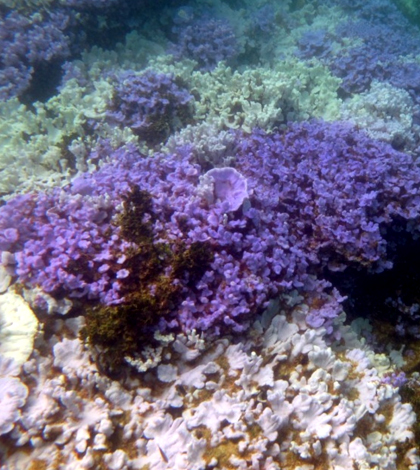Researchers suggest genetically altered coral reefs could survive climate change

Healthy lavender corals alongside white coral bleached from thermal stress near Lisianski Island. (Credit: National Oceanic and Atmospheric Administration and the Hawaii Institute of Marine Biology)
With the ongoing threats that coral reefs face, from rising water temperatures that stress their growth to rising ocean acidity that bleaches them, scientists from the Australian Institute of Marine Science and the Hawaii Institute of Marine Biology are proposing an unheard-of solution in the conservation world. Instead of doubling efforts to save coral species as they exist today, the researchers suggest modifying their genes to make them more resilient to the changing world they are currently struggling to adapt to.
The call comes after studies finding that living coral species are under threat, according to The Guardian. One study that modeled the likelihood of a massive Great Barrier Reef die-off projected living corals there could plummet to 10 percent of the total reef composition if water temperatures continue to rise. And if those types of massive die-offs occur, scientists are concerned that the populations of fish and other organisms that depend on reefs will suffer just as badly.
“The Great Barrier Reef used to be one of the more pristine examples of reefs globally, but it has suffered a decline and will continue to do so if action isn’t taken,” said Jennifer Cooper, a James Cook University doctoral student and co-author of the study, to the Washington Post. The investigation was recently published in Proceedings of the National Academy of Sciences. “Our model showed that reducing the impact of other human threats to the reef, such as overfishing and pollution, did mitigate coral decline. However, if temperature increases more than 2C (degrees Celsius) the benefit of lowering threat levels may not be enough to stop further coral loss.”
In the study’s findings, scientists call the approach they advocate “assisted evolution.” What this means is that similar approaches taken in the past by humans looking to breed certain traits into dogs or other domesticated animals, or plants even, could also be employed to help save coral reefs.
“Some people have objections in principle to any manipulations,” said Madeleine van Oppen, researcher at the Australian Institute of Marine Science and lead study author, to The Verge. “But I think these manipulations are pretty minor. Plus climate change demands it.”
The effects of climate change have led to massive declines in coral reefs from the Caribbean to Australia, says van Oppen. And at this point, there is already too much change locked into place that reducing carbon emissions today wouldn’t change. So attacking carbon dioxide emissions is important, but work has to be done to prepare for changes that are already on the horizon for coral reefs.
Scientists point to coral cross-breeding that has already occurred on its own in the wild as an example of the successes that hybridized coral species could have.
“When we cross within species, we’re looking for individuals with certain traits. When we cross different species, we’re just hoping we’re lucky and get some positive phenotypic results,” said van Oppen to The Verge. “It happens naturally, we want to see if we can harness these mechanisms to help the coral become more resilient.”
In addition to breeding coral species within themselves and with related species to encourage more preferred traits and stronger hybrid corals, researchers propose techniques that could improve symbiotic relationships they have with certain temperature-resistant microbes. These could involve introducing the right microbe strains to struggling corals in the wild, or enhancing the microbes’ evolution to be more resistant to changing water temperatures.
The ideas, though controversial for some, may prove important to saving some of the Earth’s most valuable underwater ecosystems that not only support massive fish populations, but fisheries and tourism activities worth billions of dollars.
“I think it is a last resort,” said van Oppen to The Sydney Morning Herald. “But you have to develop the biological tool kit now because it will take some time. So we have to test the various options before it is too late.”
Top image: Healthy lavender corals alongside white coral bleached from thermal stress near Lisianski Island. (Credit: National Oceanic and Atmospheric Administration and the Hawaii Institute of Marine Biology)





Pingback: gmo coral
Pingback: Thoughts? - Manhattan Reefs